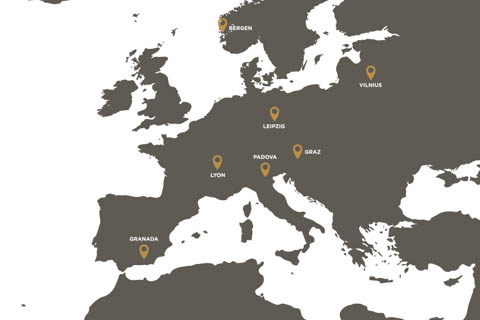 |
Faculty
Kaunas Faculty
|
|

|
Scope of studies and length
90 ECTS credits, 1,5 years |
|

|
Qualification awarded
Master in Social Sciences |
|

|
Application deadline*
1 May / 1 July* |
|

|
Language
English |
|

|
Tuition fee per year
5 500 € |
|

|
Start of studies
1 September
|
 |
City
Kaunas |
APPLY NOW
The objective of the Master’s programme Sustainable Financial Economics is to prepare a specialist at a top or higher level in macro-finance (financial economics) capable of properly evaluating, shaping, and realising business financial assets policy and strategic objectives, creating development concepts, and implementing them, taking into account modern requirements for sustainable development and social responsibility.
Programme structure
| Subjects of study |
Credits |
|
Semester 1 Autumn |
| Compulsory Courses |
25.0 |
| Economic Policy of Environmental Protection |
5.0 |
| Global Economy and Sustainable Development |
10.0 |
| Investment Risk Management |
5.0 |
| Regulation of Economic Processes |
5.0 |
| Optional Courses |
5.0 |
| International Business Environment |
5.0 |
| International Finance |
5.0 |
| Modern Banking Technologies |
5.0 |
|
Semester 2 Spring |
| Compulsory Courses |
25.0 |
| Contemporary Theories of Economics |
5.0 |
| Economic Research Methods |
10.0 |
| Intellectual Systems in Financial Markets |
5.0 |
| Scientific Research Work |
5.0 |
| Optional Courses |
5.0 |
| Social Responsibility of Transnational Corporations |
5.0 |
| Sustainable Accountability |
5.0 |
| Sustainable and Responsible Investments |
5.0 |
|
Semester 3 Autumn |
| Compulsory Courses |
30.0 |
| Master Final Thesis (Study field: Economics) |
30.0 |
Key Learning Outcomes
A graduate of the programme is able to:
- comprehend modern finance theories and their practical application;
- analyse and evaluate financial phenomena within a changing macroeconomic and sustainability context;
- critically assess and interpret contemporary economic theoretical and methodological knowledge of sustainable development and the results of scientific research;
- analyse and address the financial, ethical and social challenges in pursuing sustainable development;
- critically assess the theoretical and practical innovations in the development of a financial system, taking into account the evolving national market and global environment;
- critically assess the operations of global financial markets and financial services sectors, and their regulatory policies in the context of globalisation and sustainable development;
- apply quantitative and qualitative research methods used in finance;
- design and conduct independent research and present findings professionally;
- use modern ICT to organise and conduct scientific and business activities with respect to professional ethics and investment spirit;
- organise individual work and the work of the team, taking into account the available resources (time, human resources, infrastructure, etc.) and solve problems with respect to general ethics;
- demonstrate critical, systematic, strategic and socially responsible thinking skills.
Programme Specific Requirements
- Matura (high school leaving) certificate.
- 20 ECTS credits in Economics, Marketing, or Management Sciences as part of their undergraduate degree studies.
- Applicants with an overall grade average of at least 60% are eligible for admission.
- Motivational interview.
- English language proficiency at a level not lower than B2 (following the Common European Framework of Reference for Languages (CEFR).
In addition, all applicants have to fulfil the general admission requirements.

Why choose this programme?
- The programme uniquely combines the principles of contemporary financial economics with the goals of sustainable development and social responsibility.
- It equips students to become forward-thinking financial experts capable of shaping sustainable financial policies, strategies, and investment decisions at both macro and micro levels.
- Unlike traditional finance courses, this programme takes a financial and interdisciplinary approach, integrating sustainability, risk management and ethics into every aspect of finance decision-making. Students explore how financial systems evolve under globalisation, climate challenges, and social transformation - preparing them to lead in a rapidly changing financial world.
|
What comes after?
- The graduate will possess the necessary skills to work as an executive in finance departments or hold high-level positions in international, regional, and local business enterprises, banks, insurance companies, and pension funds.
- The graduate can also pursue analytical and executive positions in national and international financial regulatory institutions, such as National Banks, stock exchanges, and state departments.
- The graduate can pursue a PhD degree and further their career as a researcher or lecturer, and carry out research at institutes and universities.
|



